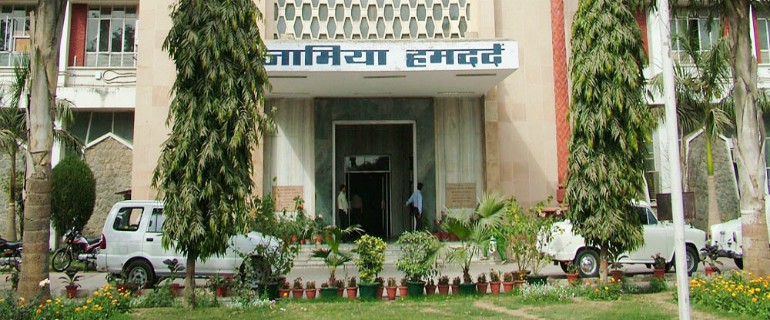| Engineering Courses | |
|---|---|
| B.Tech. (Computer Science and Engineering) | 4 Years |
| M.Tech. (Food Technology) | 2 Years |
| Ph.D. (Computer Science and Engineering) | 3 Years |

Jamia Hamdard offers the following programs:
Why Study in Jamia Hamdard
The history of Jamia Hamdard begins with the establishment of a small Unani clinic in the year 1906 by Hakeem Hafiz Abdul Majeed, one of the well-known practitioners of Unani System of Medicine of his time. Hakeem Hafiz Abdul Majeed had a vision of making the practice of Unani Medicine into a scientific discipline so that Unani medicines could be dispensed in a more efficacious manner to patients. He gave the name “Hamdard” to his venture which means “sympathy for all and sharing of pain”. His illustrious son, Hakeem Abdul Hameed, carried forward the philosophy and objectives of Hamdard in independent India. Even at the time of partition of India in 1947, Hakeem Abdul Hameed was dreaming of setting up a complex of educational institutions which would concentrate on highlighting the contribution of Islam and Islamic culture to Indian civilization and development of Unani medicines for curing diseases
On 22 Shawwal, 1367 Hijri, corresponding to 28th August, 1948, Hamdard, which was a commercial enterprise at that time, was converted into a Wakf, with the object of giving effect to Islamic teachings of public charity including health and education. In 1964, Hamdard National Foundation was created with a view to receive and disburse the profits earned by Hamdard (Wakf) Laboratories. Hamdard National Foundation was to take up charitable causes in the areas of education, medical relief and the advancement of knowledge, consistent with the principles of the true teachings of Islam. For setting up a complex of research and educational institutions, Hakeem Abdul Hameed purchased a piece of land in Tughlaqabad area of South Delhi which was hardly inhabited in those times. In order to implement and execute the objects of Wakf as enshrined in the Wakf deed, Hakeem Abdul Hameed and his Muslim associates, established several institutions for teaching and research as given below.
In 1962, Hakeem Abdul Hameed set up the Institute of History of Medicine and Medical Research with the object of promoting education and research in the history of medicine, besides appraising the principles of medicine. In 1963, Hakeem Abdul Hameed and his Muslim friends and associates set up Indian Institute of Islamic Studies with a view to promote the study of Islamic Culture and Civilization especially its contribution to Indian society and culture. In 1963, Hamdard Tibbi College was set up in Gali Qasim Jaan, Old Delhi. It was later shifted to Jamia Hamdard Campus in 1980 to provide education in Unani Medicine to students so that the heritage of Unani Medicine largely available in Arabic and Persian is passed on to the students of next generation.
There are well equipped spacious classrooms, drawing halls, laboratories, workshops and conference/seminar halls. A well stacked large library having state of art facilities has been developed. Laboratories and workshops have the best quality of equipments commensurate with the requirements of the curriculum of IP University and beyond. There are twelve computer laboratories, each equipped with the required number of computers, having latest hardware configuration and the latest software's. All the computers are networked through formatted LAN. The excellent Internet connectivity is provided via high speed dedicated optical fiber link of 200 Mbps capacity. Wi-Fi connectivity is also available in the entire campus.
In 1972, Hamdard College of Pharmacy was set up with the objective of providing education and training in all branches of pharmacy. The year 1989 saw the fulfilment of the dream of Hakeem Abdul Hameed when Jamia Hamdard was given the status of Deemed to be University by the Ministry of Human Resource Development on 10th May, 1989. All the above named institutions set up by Hakeem Abdul Hameed and his friends and associates were amalgamated into Jamia Hamdard. In a brief period of only ten years, Jamia Hamdard has evolved into an institution fulfilling the objects of the wakf, which has funded it. It was a day of great joy for Hakeem Abdul Hameed, founder and the moving spirit behind all the institutions promoted by Hamdard and his large number of friends and associates. As a means of thanking the Almighty Allah for His guidance to its founder and his associates, Jamia Hamdard adopted a Seal with the following ayat from Sura al-Jum’a from the Holy Quran:
Jamia Hamdard was conceived as a seat of higher learning in Unani Medicine, Islamic Studies, Biosciences, Pharmacy, Nursing and other areas of knowledge by its founder as a means of fulfilling the objects of the wakf. Over a period of last ten years, Jamia Hamdard has emerged as an outstanding institution of higher learning with distinct and focused academic programmes. Graduate programme in Information Technology and Computer Applications and Post-graduate programmes in Information Technology, Computer Applications, Business Management, Physiotherapy and Occupational Therapy have been started in the last few years. Undergraduate programmes in Physiotherapy and Occupational Therapy are being introduced from this year. Jamia Hamdard offers postgraduate and doctoral programmes in several disciplines for which advanced facilities are available.
To know more about the Admission Process call us at +91-9538317377 | +91-7411666661

Global Education Fair
Get Expert Guidance on Top institutions, Courses, Admission, Fees, Visa & Scholarships Attend the Global Education Fair & apply for scholarships & spot offers
Register Now

University Visit
Meet delegates from Top Institutions at Global Opportunities PAN India Branches. Plan your career with our experts and secure your future!
Visit us